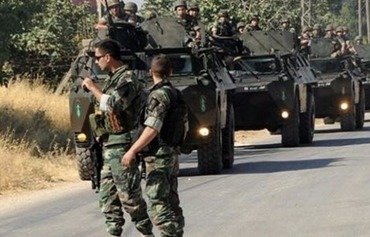The security plan that has been in effect in the Baalbek-Hermel area of the northern Bekaa Valley since June has borne fruit, officials said, noting that the sight of lawless armed gangs has begun to disappear from the region.
Over the past year, the security situation in the area had deteriorated, with regular reports of armed clashes, gunfire, car theft, drug manufacture and trafficking, and kidnapping for ransom.
On June 17th, Lebanese armed forces started deploying in the Baalbek-Hermel area as part of the new security plan, which involves conducting raids that target key figures wanted for major criminal operations.
Soon after, security forces arrested one of the most important heads of car theft networks in the area of al-Qasr-Hermel.
![The Layali Baalbek troupe performs the folkloric dabke dance and Baalbeki songs in the city’s market on August 11th. [Tamer Abu Zaid/Al-Mashareq]](/cnmi_am/images/2018/09/06/14342-baalbek-dance-600_384.jpg)
The Layali Baalbek troupe performs the folkloric dabke dance and Baalbeki songs in the city’s market on August 11th. [Tamer Abu Zaid/Al-Mashareq]
A month later, the Lebanese army conducted a raid near the town of Brital targeting one of the most notorious drug-trafficking gangs in the Baalbek-Hermel area.
Eight people were killed, including a suspected drug trafficking baron, in the July 23rd raid on his home in eastern Lebanon, the army said.
"An army unit raided the house of Ali Zayd Ismail, wanted on several counts of drug trafficking in the area of al-Hamudiya-Brital" in the Bekaa Valley, which borders Syria, the army said.
"The unit was shot at ... forcing the force's members to retaliate, which led to the killing of eight gunmen," it said in a statement.
The army said it detained a further 41 people -- 16 Lebanese and 25 Syrians -- and seized weapons and drugs, Lebanon's Naharnet reported.
Bringing back tourism
In conjunction with the security plan, civil society organisations have been working hard to restore the city of Baalbek's image back to its former glory.
Long-renowned for its history and its ancient Roman citadel, Baalbek has been shunned by tourists in recent years, put off by the area's reputation for crime.
A media tour was organised last month to convey the image of the city and the atmosphere of security and stability that it has begun to enjoy.
"The city of Baalbek has long been distinguished by its profound authenticity, the good-heartedness of its people and its generous hospitality," Safe Side founder Hussein Yaghi told Al-Mashareq.
Safe Side, which aims to restore Baalbek's reputation and facilitate the return of tourists, conducted the media tour August 11th "as an initiative that aims to communicate with the people of Baalbek and hear their concerns", Yaghi said.
"Many problems and acts of lawlessness are attributed to Baalbek and project an image [of the city] that is totally different from reality," he said.
The media tour included getting reporters acquainted with the most prominent landmarks of the city, said Yaghi, including the famous temples of Jupiter and Bacchus.
It also included a tour on foot through the city's old souks and discovering what the City of the Sun has to offer, especially the sfiha (pie-like pastry), tannour bread, koufiyah traditional headdress and glass and copper vessels.
Tourists could also be seen moving about between Hajar al-Hubla (Pregnant Woman rock) -- the largest Roman rock in the world, -- al-Bayada Lake and Marjet Ras al-Ain park, which extends over an area of about 50,000 square metres.

![A media tour was organised August 11th in the city of Baalbek to convey the atmosphere of security and stability that it has begun to enjoy after recent security crackdowns on crime. [Tamer Abu Zaid/Al-Mashareq]](/cnmi_am/images/2018/09/06/14282-Lebanon-Baalbek-festival-600_384.jpg)







Thank you, thank you, thank you, thank you, thank you. All my respect goes to you. Children of the Sun.
Reply1 Comment(s)